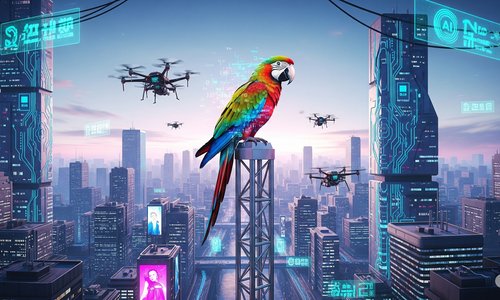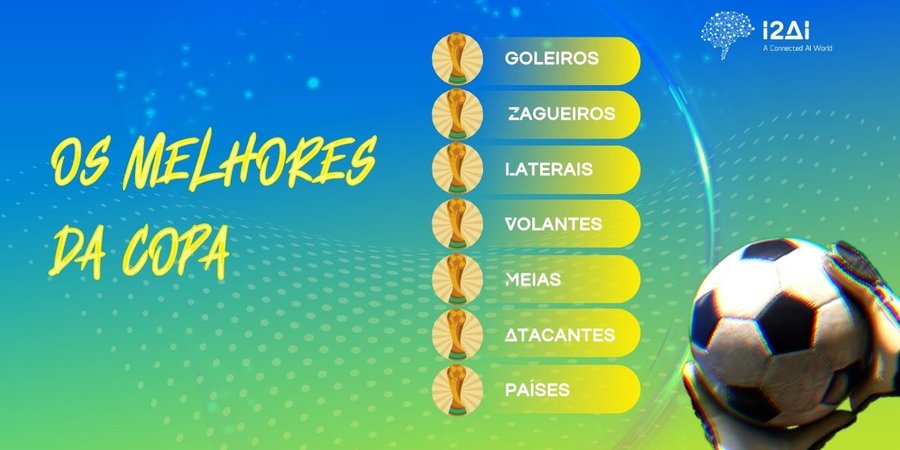
A Promessa e o Perigo da Nova Revolução Digital
A nova corrida tecnológica global levanta uma pergunta urgente: estamos prontos para confiar na inteligência que criamos?

De acordo com o FIF-AI, dos quase 1.000 jogadores que atuaram na Copa do Mundo, seguem os dez mais em casa posição, por ordem de melhor para pior. Na classificação foram desconsiderados os jogadores que atuaram em somente uma partida e a medida de avaliação para criação do ranking foi a média individual por partida do FIF-AI.
Goleiros (*):
1) Unai Simon, Espanha
2) Yann Sommer, Suíça
3) Manuel Neuer, Alemanha
4) Thibaut Courtois, Bélgica
5) Matt Turner, Estados Unidos
6) Andries Noppert, Holanda
7) Guillermo Ochoa, México
8) Jordan Pickford, Inglaterra
9) Dominik Livakovic, Croácia
10) Kasper Schmeichel, Dinamarca
(*) Experimentalmente a IA relacionou os goleiros que, quando exigidos, tiveram a melhor performance. Nas análises anteriores do FIF-AI os goleiros não foram considerados.
Zagueiros:
1) Aymeric Laporte, Espanha
2) Andreas Christensen, Dinamarca
3) Jan Vertonghen, Bélgica
4) Toby Alderweireld, Bélgica
5) Nicolás Otamendi, Argentina
6) John Stones, Inglaterra
7) Josko Gvardiol, Croácia
8) Joachim Andersen, Dinamarca
9) Harry Maguire, Inglaterra
10) Tim Ream, Estados Unidos
Laterais:
1) Jordi Alba, Espanha
2) Josip Juranovic, Croácia
3) Timothy Castagne, Bélgica
4) Eder Militão, Brasil
5) Luke Shaw, Inglaterra
6) Alex Sandro, Brasil
7) David Raum, Alemanha
8) Danilo, Brasil
9) Silvan Widmer, Suíça
10) Theo Hernández, França
Volantes:
1) Rodri, Espanha
2) Rodrigo de Paul, Argentina
3) Joshua Kimmich, Alemanha
4) Axel Witsel, Bélgica
5) Tyler Adams, Estados Unidos
6) Pierre Hojbjerg, Dinamarca
7) Marcelo Brozovic, Croácia
8) Frenkie de Jong, Holanda
9) Aurélien Tchouaméni, França
10) Luka Modric, Croácia
Meias:
1) Pedri, Espanha
2) Mateo Kovacic, Croácia
3) Enzo Fernández, Argentina
4) Rodrigo Bentancur, Uruguai
5) Alistair Johnston, Canadá
6) Federico Valverde, Uruguai
7) Stephen Eustáquio, Canadá
8) Christian Eriksen, Dinamarca
9) Aissa Laidouni, Tunísia
10) In-beom Hwang, Coreia do Sul
Atacantes:
1) Antoine Griezmann, França
2) Akram Afif, Catar
3) Lionel Messi, Argentina
4) Neymar, Brasil
5) Salem Al Dawsari, Arábia Saudita
6) Joel Campbell, Costa Rica
7) Serge Gnabry, Alemanha
8) Raphinha, Brasil
9) Ousmane Dembélé, França
10) Hassan Al Haydos, Catar
Pelo FIF-AI, o ranking de seleções ficaria da forma a seguir. Lembrando que intensidade é um ótimo indicador de performance de jogo, mas gols é que definem:
1) Espanha
2) Argentina
3) Inglaterra
4) Alemanha
5) Brasil
6) Bélgica
7) Dinamarca
8) Croácia
9) Portugal
10) Holanda
11) França
12) Estados Unidos
13) Canadá
14) Suíça
15) Coreia do Sul
16) Uruguai
17) Equador
18) México
19) Sérvia
20) Japão
21) País de Gales
22) Catar
23) Senegal
24) Marrocos
25) Camarões
26) Tunísia
27) Arábia Saudita
28) Austrália
29) Polônia
30) Costa Rica
31) Gana
32) Irã
A seguir o gráfico de intensidade de jogo das equipes que estão disputaram a final. Aqui ainda não há os dados do jogo de hoje, onde a Argentina conquistou a Copa.
E na sequência, o gráfico de intensidade das equipes que disputaram o 3º lugar, vencido pela Croácia.
A Inteligência Artificial não entende de futebol, mas revela padrões e detalhes importantes para profissionais, especialistas e executivos que desejam identificar pontos chave de melhora consistente nos seus negócios.
Uma das grandes vantagens da IA é a capacidade de análise em profundidade em tempo real, mantendo o negócio em questão com alto nível de dinamismo.
(*) FIF-AI: Fator de Intensidade de Futebol, desenvolvido com aplicação de IA - Inteligência Artificial aplicada a dados de futebol gerados a partir de jogos de alta performance e atualizado com técnicas de aprendizado contínuo.

A nova corrida tecnológica global levanta uma pergunta urgente: estamos prontos para confiar na inteligência que criamos?

Por que dominar a IA será a nova alfabetização do século XXI

Conselhos de Administração devem evoluir da supervisão reativa para a antecipação estratégica, frente à crescente complexidade e volatilidade dos ambientes de negócios.

De 14 a 25 de julho, reserve suas manhãs das 08h00 às 09h30 para participar da tradicional Maratona I2AI! Uma jornada intensa com debates e palestras sobre temas essenciais: Ética,